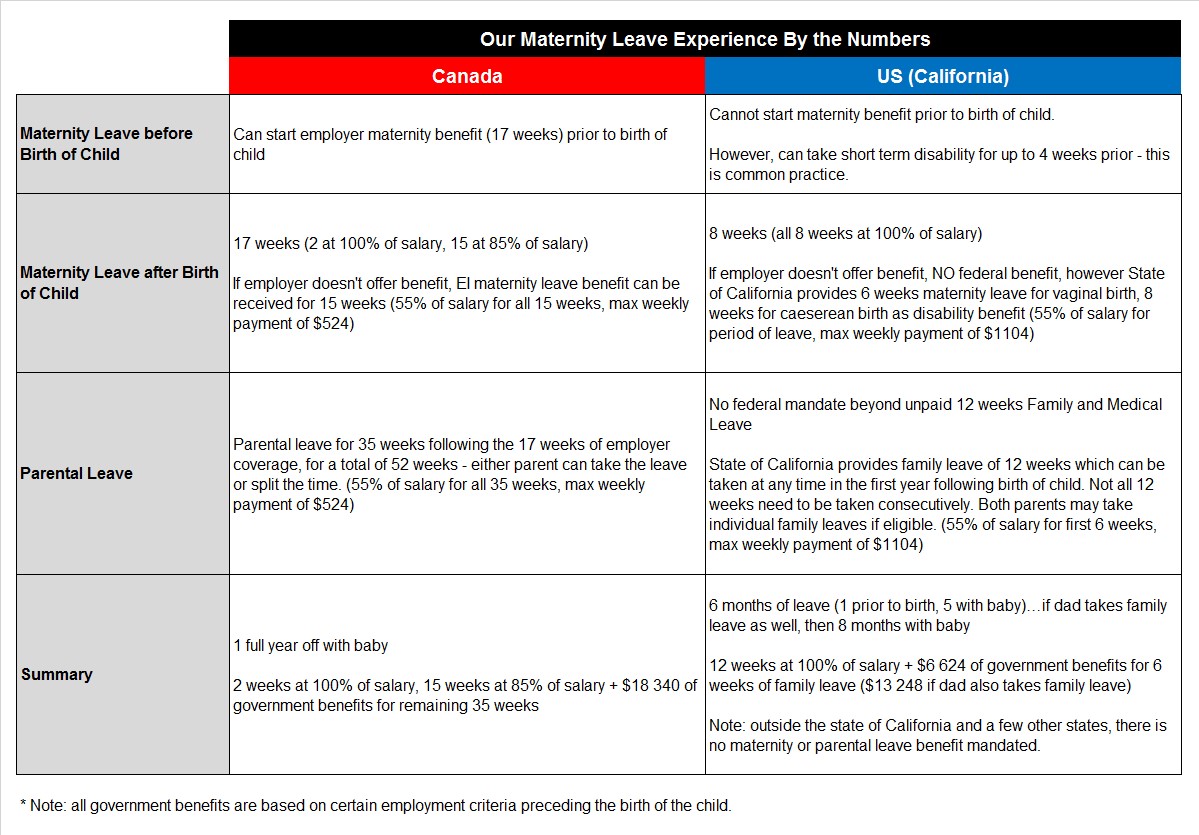Canada vs U.S. Maternity Leave: Here’s Our Experience With Both
By: Thomas Sigsworth on March 3, 2015
When Radhika and I moved from Toronto to San Francisco two and half years ago with our toddler, we knew it would be an eye-opening experience. We’d travelled to the Golden State many times, but you know what they say: to really get to know a place, you have to live there.
And come to know it we have: both the good parts, which are almost too numerous to list (weather, food, wine, etc) and the bad, which include an outrageously high cost of living, a byzantine medical system, and, as we learned getting ready for the birth of our second child, maternity leave that really does leave you wanting.
When my wife found out she was pregnant with our second child last year, we knew right away that we’d have to start researching, planning – and saving – for maternity leave, U.S. style. And now that our son is four months old, it's safe to say we’ve seen both the Canadian and American systems up close – here’s what we found.
Good-Bye 12 Months, Hello 12 Weeks (Unpaid)
Paltry. Meagre. Shocking. Offensive. Those are some the adjectives Canadians living south of the border use when they first start looking into U.S. maternity leave benefits, especially if they’ve already experienced maternity leave in Canada. We were no different.
In the U.S., the Family and Medical Leave Act (which only passed in 1993) allows Moms who are employed at companies with 50 or more people to take up to 12 weeks of unpaid leave.
There’s a pretty big catch though: if you work at a company with less than 50 employees, this benefit does not apply to you, which means any time off work you’ll get is pretty much left up to the tender mercies of your boss.
Looking with Canuck eyes at U.S. Federal mat leave benefits, you can’t help but think, ‘is this for real?’
It is, unfortunately – at least in most states.
California to the Rescue – Sort Of
We knew we liked this state! California is one of the few places south of the border that offers a paid family leave benefit to new parents. The leave comes courtesy of the 2002 Paid Family Leave Act, which allows California residents to take time off for a variety of family duties, including bonding with a baby.
You can get up to 12 weeks family leave at 55% of your salary, up to a maximum of $1104 per week. That’s actually more than double the Canadian max weekly benefit of $524, believe it or not.
Employers Matter
In both Canada and the U.S., where you work can have big financial implications for your maternity leave. Many employers provide paid maternity leave on top of standard government benefits, but the amount and duration of the payouts vary from company to company.
We know couples in Canada where the Mom got six months maternity pay at nearly 100% of salary, while other Moms received barely anything beyond the minimum Federal benefit.
These variances in employer-paid leave are present in the U.S. too. In Silicon Valley, where my wife works, we’ve heard of some employers giving four months paid leave. She got 8 weeks. Many women get less than that, even in the Valley.
Financial Implications of the Two Systems
There is a lot of conflicting information out there about the real world differences between U.S. and Canadian mat leaves. This is how the financials and time off broke down for us in Canada (baby#1) and the U.S. (baby#2!).

All in, with Radhika’s two months of paid time off, the California Leave and six weeks of vacation, she has been able to cobble together around five and a half months off. Not great, but not as short as we had initially thought it would be.
The only real upside to having our baby in California is that with less time off, we don’t need to worry about having a reduced household income quite as much. Our income is really only reduced during the California Leave period, which still pays out a decent benefit.
Still, if we had to pick, it sort of goes without saying that we’d take the Canadian mat leave system. At the end of the day, the time is more important than the money!


